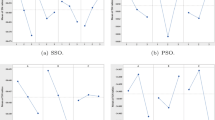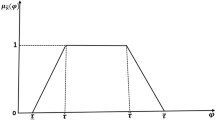Abstract
Project scheduling problem is to determine the schedule of allocating resources to achieve the trade-off between the project cost and the completion time. In real projects, the trade-off between the project cost and the completion time, and the uncertainty of the environment are both considerable aspects for managers. Due to the complex external environment, this paper considers project scheduling problem with coexisted uncertainty of randomness and fuzziness, in which the philosophy of fuzzy random programming is introduced. Based on different ranking criteria of fuzzy random variables, three types of fuzzy random models are built. Besides, a searching approach by integrating fuzzy random simulations and genetic algorithm is designed for searching the optimal schedules. The goal of the paper is to provide a new method for solving project scheduling problem in hybrid uncertain environments.
Similar content being viewed by others
References
Charnes A., Cooper W. W. (1959) Chance-constrained programming. Management Science 6: 73–79
Charnes A., Cooper W. W., Thompson G. L. (1964) Critical path analysis via chance constrained and stochastic programming. Operational Research 12: 460–470
Demeulemeester E. (1995) Minimizing resource availability costs in time-limited project networks. Management Science 41(10): 1590–1598
Freeman R. J. (1960) A generalized PERT. Operations Research 8(2): 281
Gao J., Liu B. (2001) New primitive chance measure of fuzzy random event. International Journal of Fuzzy Systems 3(4): 527–531
Golenko-Ginzburg D., Gonik A. (1997) Stochastic network project scheduling with non-consumable limited resources. International Journal of Production Economics 48(1): 29–37
Hapke M., Slowinski R. (2000) Fuzzy set approach to multi-objective and multi-mode project scheduling under uncertainty. In: Hapke M., Slowinski R. (eds) Scheduling under fuzziness. Physica-Verlag, Heidelberg, pp 197–221
Ke H., Liu B. (2005) Project scheduling problem with stochastic activity duration times. Applied Mathematics and Computation 168(1): 342–353
Ke H., Liu B. (2010) Fuzzy project scheduling problem and its hybrid intelligent algorithm. Applied Mathematical Modelling 34(2): 301–308
Ke H., Ma W., Gao X., Xu W. (2010) New fuzzy models for time-cost trade-off problem. Fuzzy Optimization and Decision Making 9(2): 219–231
Kelley J. E. Jr (1961) Critical path planning and scheduling mathematical basis. Operations Research 9(3): 296–320
Kelley, J. E. Jr. (1963). The critical path method: Resources planning and scheduling. In M. Thompson (Ed.), Industrial scheduling (Chapter 21), New Jersey: Prentice-Hall.
Kruse R., Meyer K. D. (1987) Statistics with vague data. D. Reidel Publishing, Dordrecht
Kwakernaak H. (1978) Fuzzy random variable-I. Definitions and theorems. Information Sciences 15: 1–29
Kwakernaak H. (1979) Fuzzy random variable-II. Algorithms and examples for the discrete case. Information Sciences 17: 253–278
Liu B. (1997) Dependent-chance programming: A class of stochastic programming. Computers & Mathematics with Applications 34(12): 89–104
Liu B. (2001) Fuzzy random chance-constrained programming. IEEE Transactions on Fuzzy Systems 9(5): 713–720
Liu B. (2001) Fuzzy random dependent-chance programming. IEEE Transactions on Fuzzy Systems 9(5): 721–726
Liu B., Liu Y. K. (2002) Expected value of fuzzy variable and fuzzy expected value models. IEEE Transactions on Fuzzy Systems 10: 445–450
Liu B. (2004) Uncertainty theory: An introduction to its axiomatic foundations. Springer, Berlin
Liu Y. K., Liu B. (2003) Fuzzy random variable: A scalar expected value operator. Fuzzy Optimization and Decision Making 2(2): 143–160
Long L. D., Ohsato A. (2008) Fuzzy critical chain method for project scheduling under resource constraints and uncertainty. International Journal of Project Management 26(6): 688–698
Alanya L., Alanya E. (2001) Uncertainty modelling in software development projects (with case study). Annals of Operations Research 102(1–4): 157–178
Prade H. (1979) Using fuzzy set theory in a scheduling problem: A case study. Fuzzy Sets and Systems 2(2): 153–165
Puri M. L., Ralescu D. (1986) Fuzzy random variables. Journal of Mathematical Analysis and Applications 114: 409–422
Vanhoucke M. (2008) Setup times and fast tracking in resource-constrained project scheduling. Computers & Industrial Engineering 54(4): 1062–1070
Wang J. R. (1999) A fuzzy set approach to activity scheduling for product development. Journal of the Operational Research Society 50: 1217–1228
Wang J. R. (2002) A fuzzy project scheduling approach to minimize schedule risk for product development. Fuzzy Sets and Systems 127(2): 99–116
Author information
Authors and Affiliations
Corresponding author
Rights and permissions
About this article
Cite this article
Ke, H., Ma, W. & Ma, J. Solving project scheduling problem with the philosophy of fuzzy random programming. Fuzzy Optim Decis Making 11, 269–284 (2012). https://doi.org/10.1007/s10700-012-9133-x
Received:
Accepted:
Published:
Issue Date:
DOI: https://doi.org/10.1007/s10700-012-9133-x




